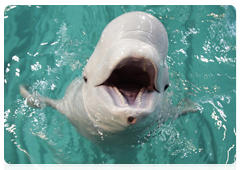MULTIMEDIA
 +
+
In the White Sea, belukhas are noted for the vast span of their migrations, with only a small number of the mammals remaining in the same area throughout the year and the rest migrating to the Barents Sea and the Kara Sea in winter
 +
+
The belukha inhabits waters of different temperatures, ranging from freezing waters in winter to 32°C in summer
 +
+
Russian waters have three major groups of whales which some zoologists consider to be three different subspecies: namely those inhabiting the White Sea, the Kara Sea and the Far Eastern waters
 +
+
The belukha is one of the most numerous Arctic marine mammal species. They inhabit the coastal waters of the Arctic, as well as of the White Sea, the Barents Sea, the Bering Sea, and the Sea of Okhotsk
 +
+
The belukhas kept in zoos are trained with the use of special programs for interaction with veterinarians, scientific experiments, shows at aquariums and dolphin therapy





 ABOUT THE PROGRAMME
ABOUT THE PROGRAMME
 WHITE WHALE: LIFE, BEHAVIOUR AND MORE
WHITE WHALE: LIFE, BEHAVIOUR AND MORE
 WHITE WHALE RESEARCH: A HISTORY
WHITE WHALE RESEARCH: A HISTORY
 VLADIMIR PUTIN'S VISIT
VLADIMIR PUTIN'S VISIT
 NEWS
NEWS
 MULTIMEDIA
MULTIMEDIA